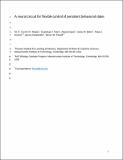A neural circuit for flexible control of persistent behavioral states
Author(s)
Ji, Ni; Madan, Gurrein K; Fabre, Guadalupe I; Dayan, Alyssa; Baker, Casey M; Kramer, Talya S; Nwabudike, Ijeoma; Flavell, Steven W; ... Show more Show less
DownloadPublished version (33.26Mb)
Publisher with Creative Commons License
Publisher with Creative Commons License
Creative Commons Attribution
Terms of use
Metadata
Show full item recordAbstract
To adapt to their environments, animals must generate behaviors that are closely aligned to a rapidly changing sensory world. However, behavioral states such as foraging or courtship typically persist over long time scales to ensure proper execution. It remains unclear how neural circuits generate persistent behavioral states while maintaining the flexibility to select among alternative states when the sensory context changes. Here, we elucidate the functional architecture of a neural circuit controlling the choice between roaming and dwelling states, which underlie exploration and exploitation during foraging in <jats:italic>C. elegans</jats:italic>. By imaging ensemble-level neural activity in freely-moving animals, we identify stereotyped changes in circuit activity corresponding to each behavioral state. Combining circuit-wide imaging with genetic analysis, we find that mutual inhibition between two antagonistic neuromodulatory systems underlies the persistence and mutual exclusivity of the neural activity patterns observed in each state. Through machine learning analysis and circuit perturbations, we identify a sensory processing neuron that can transmit information about food odors to both the roaming and dwelling circuits and bias the animal towards different states in different sensory contexts, giving rise to context-appropriate state transitions. Our findings reveal a potentially general circuit architecture that enables flexible, sensory-driven control of persistent behavioral states.
Date issued
2021-11-18Department
Picower Institute for Learning and Memory; Massachusetts Institute of Technology. Department of Brain and Cognitive Sciences; Massachusetts Institute of Technology. Department of BiologyJournal
eLife
Publisher
eLife Sciences Publications, Ltd
Citation
Ji, Ni, Madan, Gurrein K, Fabre, Guadalupe I, Dayan, Alyssa, Baker, Casey M et al. 2021. "A neural circuit for flexible control of persistent behavioral states." eLife, 10.
Version: Final published version